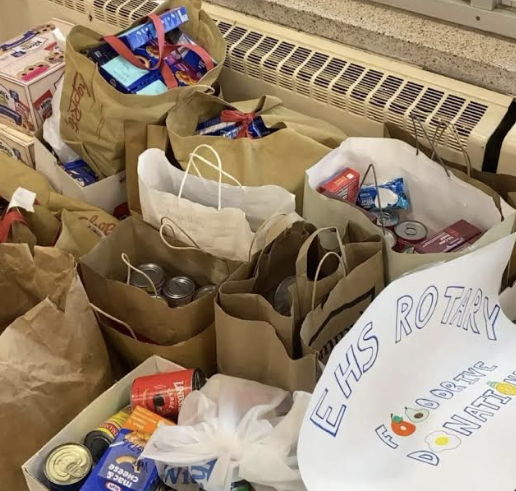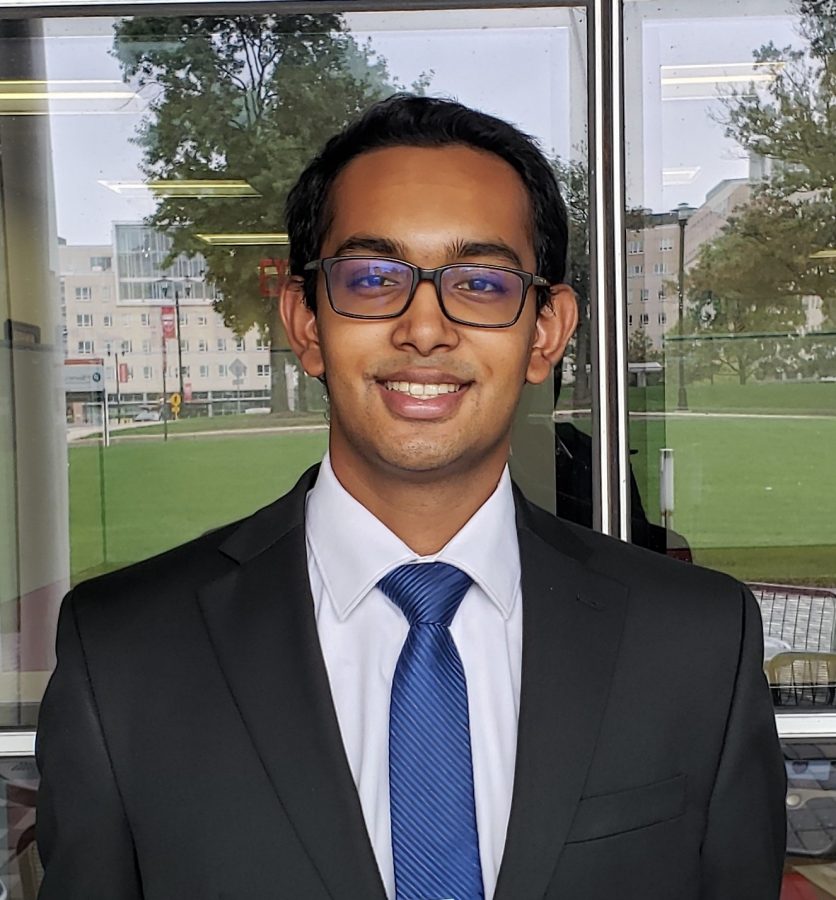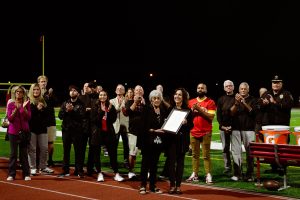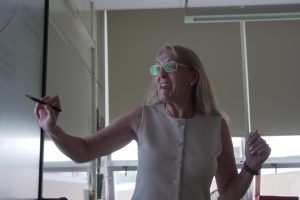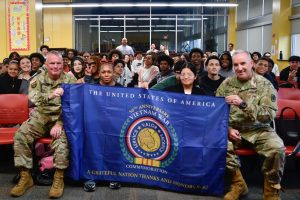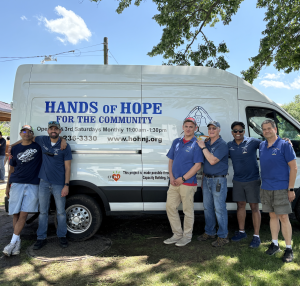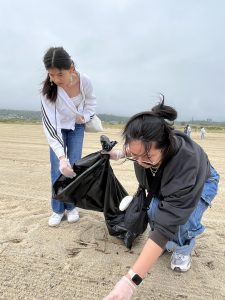A Call From Eagles Out of the Nest: Sameer Bhuyan ‘19
November 19, 2021
Want relatable advice, underclassmen? Look no further. Sameer Bhuyan ‘19 hosts a podcast just for that!
Having been involved in DECA, Library Council, National Honor Society, Heroes & Cool Kids Program, and the EHS Tennis Team, he is familiar with an academically strenuous high school life. Currently, he is majoring in Business Analytics & Information Technology (BAIT) and Finance at Rutgers University, where he is also involved in BITS (Business Info Tech Society), RSVP (Road to Silicon V/Alley), RIC (Rutgers Insurance Club), and RUOC (Rutgers University Outdoor Club). But, he’s also an Eagle Scout who stays connected with his outdoor skills and gives back to his community through RUOC.
The Eagle’s Eye contacted Bhuyan for a chat about his high school experiences and advice for EHS students.
EE: I hear you have a podcast. Could you describe what you’re doing with it more in detail?
SB: It’s a work in progress. I came up with this idea to create a podcast for high schoolers, like yourself, incoming freshmen, and other underclassmen in college to really understand life in college. It’s been slow in that you really need to build rapport and need to learn from a lot of kids, but that’s what the podcast is about—to help you understand that college is a great big world. The second thing is “it’s okay not to be okay”—that’s one of the missions of the podcast. It’s okay to feel lost—you will 100 percent feel like you have no idea what’s going on in the world, and that’s okay. The third thing, the motto of the podcast, is “think, learn, apply, and proceed.” Think about what you want to do, learn about how people did it, apply those skills, and proceed whether you succeed or fail. It’s been hard, but it’s been a great journey so far.
EE: Any special guests? Where can we listen to it?
SB: A lot of EHS alumni have come on. I had a couple of entrepreneurs from the college environment… One of my guests won the Holt Prize [similar to a Nobel Prize but for college] for Rutgers. One of my mentors was ranked Forbes’ 40 under 40 or 50 under 50, and I’m trying to get him on. I had a hedge fund guy come on. A lot of EHS alumni have come on… you’ll recognize their younger siblings or someone related to them in EHS.
It’s on all major platforms. All you have to do is search up “REAQT.”
For the podcast lovers out there, you can support an EHS alum and receive great advice by listening to REAQT on most major podcast platforms.
- Apple Podcast: https://podcasts.apple.com/us/podcast/reaqt/id1516474212
EE: Speaking of preparation, how do you think EHS prepared you for the college experience, specifically your major?
SB: Right off the bat, I have to say that AP classes are definitely helpful resources and opportunities in that you are on a more rigorous track—you’re given more stricter deadlines, and a lot of information is being thrown at you. You really need to understand the importance of information, how to understand that information in the most appropriate manner, and how fast or well can you understand that information. When you’re looking for jobs, that’s what a lot of recruiters are looking for: how well can you understand information, how can you act on a set of given information.
Just being in the environment. A lot of teachers, staff members at EHS, are great and they prepare you. When you talk to them, or chat with them and say “I’m struggling with this” or “I really need advice on this,” they are 100 percent down to help you and give you their insight. Just talking to teachers was a great resource.
EE: What were your hobbies? What clubs and sports did you participate in? What impact did they have on your interests and you as a person?
SB: I was in DECA. I had the great opportunity of leading it, being on the executive board for two years. That really prepared me for my major. A lot of the events we had, specifically competitions (regionals and states), were super helpful. Just being in an environment where you’re being a professional and seeing professionals makes you ten times more prepared. I’m sure you’ve heard of the quote “If you surround yourself with five people, you’ll be the average of those people.” But, that quote really comes alive in that environment. When you surround yourself with professionals, you will become a professional. The state competition was in Atlantic City, and I went there with a team. In those three days, I definitely changed 100 percent in that I learned how to speak better and be a better professional. Learning this in high school definitely gave me an edge.
I was part of the EHS Tennis Team for four years, and just working with the team and playing tennis was super fun. I didn’t make the team my senior team, but I was part of the team. I didn’t play every game, but just being part of a team environment where you’re working together to achieve a collective goal is important and admirable. People love to see it, and you’re proud of those achievements.
EE: How would you describe your transition from high school to college?
SB: In one word: rough. 100 percent very rough. When you switch from an environment like high school where you’re a senior to college where you’re at the bottom of the ladder, you’re in no position to be as confident as you were. Of course, you should have self-confidence, but there is this over-confidence that we build in our senior year—you guys are top dogs. Then, you go to college—no one knows you, no one respects you, no one really wants to listen to you even if you have some really great advice to share. You have to learn how to take hits; you have to re-learn how to be a freshman again. It’s very difficult to share your achievements—to show that you’re some sort of qualified candidate for jobs and internships—without overstepping.
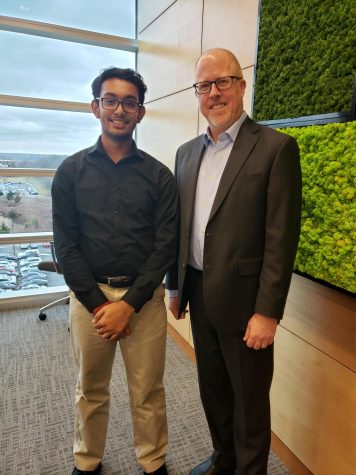
EE: If you can remember it, what is your advice on the college application process, and what was the hardest part for you?
SB: I’m in the same boat as well now, applying to jobs and grad school. I’m taking the GMAT [Graduate Management Admission Test], which is your SAT. I think the greatest struggle was just staying on deadlines—you’re trying to organize myself so you can submit them on time. You want to make sure you get them checked by teachers and get your letters of recommendation.
EE: So, let’s talk more about what you’re doing now. What area are you specializing in within business? Can you talk about your internships and projects so far?
SB: Business Analytics and Info Tech (BAIT)—a very interesting name that always makes me think of fishing—basically combines business intelligence, business management, statistics, and a bit of computer science. And my double major in finance revolves around understanding capital markets—so, obviously the stock market, but also the bond market, foreign exchange rates, and arbitrage.
Similar to coding languages, we use Microsoft Excel to create evaluations, finding how much a stock of a company would be. Later on, in finance, you’ll learn about discounted cash flow (DCF) evaluation, which is a project many finance students take on. It’s similar to coding a program as a solution from certain statistics and presenting it.
Management consulting is working with a company to understand what management strategies and policies they have and how to provide solutions on management problems that are currently existing. So, one of the big classes I took was “Management Skills,” which literally teaches management consulting. You’re acting as a management consultant to an organization—that project is probably one of the biggest projects any Rutgers business student, regardless of major, will ever take on. It’s a huge project with a lot of deliverables that you have to submit. A large chunk of that project gets talked about and used in interviews.
In terms of internships, I did two externships with AT&T. They were more qualitative based, so there was not much coding or Excel involved. It was more so understanding concepts like corporate social responsibility. I learned business acumen skills that might not be taught in school. I also did a business consulting certification at Deloitte on technology consulting. The situation was I was working with a bank, and they were coming up with solutions on how to streamline their processes better online. So, I was coming up with solutions and pitching ideas. I’m currently volunteering with social media marketing.
From first semester freshman year of college, Bhuyan took six classes, or eighteen credits, a semester, despite being met with a harder workload and classes that progressed four times faster. After two summers of extra classes during the pandemic, he is graduating a year early as a senior in the Rutgers class of 2021-22.
EE: After all these experiences, where do you see your major taking you in the future? What career do you see yourself within the next ten years? 25 years?
SB: I want to land some sort of role in business analytics, financial analytics, business consulting, or auditing. I expect myself to work in these roles and maybe get an MBA within the first eight to ten years. After that, I might want to change companies within those four categories or risk management, whichever I like most. While I’m doing that, I want to get into the start-up environment and follow the path of entrepreneurship—get my own company up and running.
EE: Is there any major you have pursued if not business, and why?
SB: I actually got into computer science before the business schools at Rutgers, so if the business school said no, I would’ve ended up doing computer science. But, that’s not something I would’ve picked. If not that, it would’ve been math. If not that not, in my interest—I know my parents might not have been behind this—world history.
EE: Is there anything you wouldn’t have known about Rutgers until you attended there?
SB: The idea that people thought that Rutgers was their dream school was very interesting. I obviously knew that I wanted to go to Rutgers, but it wasn’t like a dream school for me. If you asked me senior year, I probably would’ve said my dream school was UPenn. I would’ve been the one kid banging on the door for UPenn. But, there were a lot of people who came in and said they would’ve banged on the door for Rutgers. You learn a lot about diversity. Specifically for EHS, we are diverse, but it has a lot more Asian and White presence, compared to international presence. But, at Rutgers, you’re going to meet people from China, Tokyo, Australia, and Norway. Rutgers really is an international school.
The rigor as well–I didn’t expect to face such challenges—it’s the same across any college though. But, that was something I totally misjudged.
Everyone says that college is the best time of your life, but that’s a very false statement. I’m not saying college is the worst time, but college is what you make of it. I have a lot of friends who still say that high school was the best time because they made high school fun. But, they didn’t make college fun. So, you have to make college fun—you have to put the effort in to make college, or whatever you do, fun.
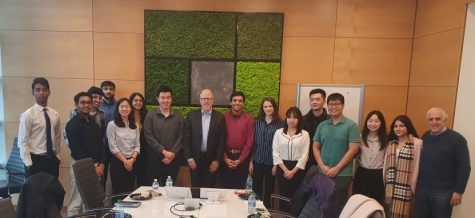
EE: If you could go back to freshman year of high school, is there any choice you would change? If so, why?
SB: I honestly don’t think so. I think my journey since freshman year of high school to the end was definitely some sort of roller coaster ride. I think if I changed one piece, it would affect everything. I’m very blessed, I guess, to say I had a great journey and great teachers. Listen, “what if?” will always be a question. So, you might as well stop thinking about it and enjoy life.
EE: Along those lines, what would be your main piece of advice to current high schoolers?
SB: Calm down. It’s a very serious and very important concept. You have to learn how to calm down because you’re going to face a lot of challenges throughout life, more so than you are now.





